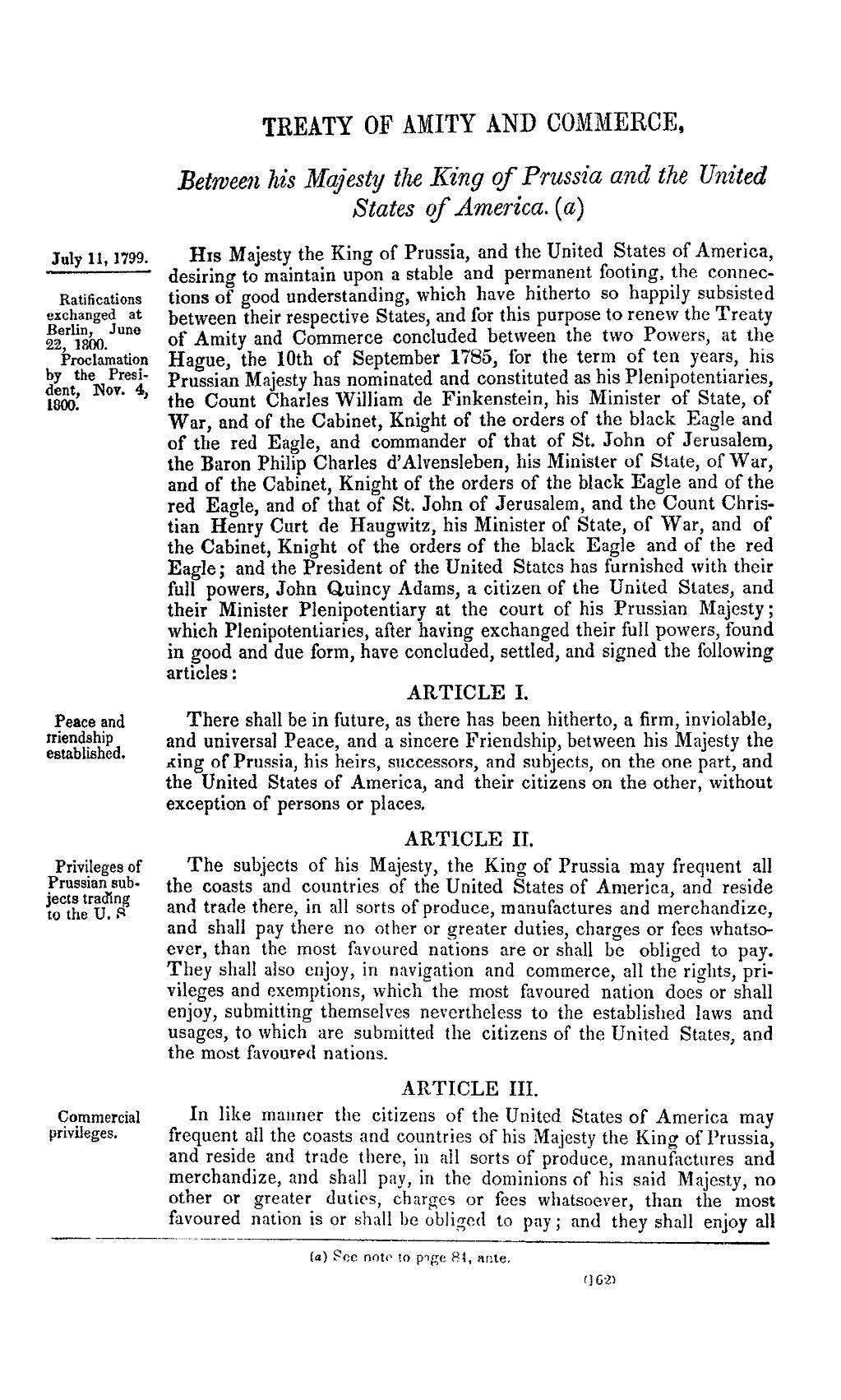TREATY OF AMITY AND COMMERCE. Between his Majesty the King of Prussia and the United States <y" America. (a) July 11, 1799. Hrs Majesty the King of Prussia, and the United States of America, """"‘_'"" desiring to maintain upon a stable and permanent footing, the connec- Ratirieatioris tions of good understanding, which haveihitherto so happily subsrsted
- "°lI“”g“d at between their respective States, and for this purpose to renew the Treaty
g;dj‘§i)0_`hm° of Amity and Commerce concluded between the two Powers, at the Proclamaticp Hague, the 10th of September 1785, for the term of ten years, his g;'mth°N£f°s,j_' Prussian Majesty has nominated and constituted as his Plenipotentiaries, igggf' the Count Charles William de Finkenstein, his Minister of State, of War, and of the Cabinet, Knight of the orders of the black Eagle and of the red Eagle, and commander of that of St. John of Jerusalem, the Baron Philip Charles d’Alvensleben, his Minister of State, of War, and of the Cabinet, Knight of the orders of the black Eagle and of the red Eagle, and of that of St. John of Jerusalem, and the Count Christian Henry Curt de Haugwitz, his Minister of State, of War, and of the Cabinet, Knight of the orders of the black Eagle and of the red Eagle; and the President of the United States has furnished with their full powers, John Quincy Adams, a citizen of the United States, and their Minister Plenipotentiary at the court of his Prussian Majesty; which Plenipotentiaries, alter having exchanged their full powers, found in good and due form, have concluded, settled, and signed the following articles: ARTICLE I. Peace and There shall be in future, as there has been hitherto, a tirm, inviolable, Llgsgjgegjjgd and universal Peace, and a sincere Friendship, between his Majesty the ' icing of Prussia, his heirs, successors, and subjects, on the one part, and the United States of America, and their citizens on the other, without exception of persons or places. ARTICLE II. Privileges of The subjects of his Majesty, the King of Prussia may frequent all €;*§i;¥5;*1¤b· the coasts and countries of the United States of America, and reside {0 me U_ sg and trade there, in all sorts of produce, manufactures and merchandize, and shall pay there no other or greater duties, charges or fees whatsoever, than the most favoured nations are or shall be obliged to pay. They shall also enjoy, in navigation and commerce, all the rights, privileges and exemptions, which the most favoured nation does or shall enjoy, submitting themselves nevertheless to the established laws and usages, to which are submitted the citizens of the United States, and the most favoured nations. ARTICLE III. Qqmmgycjgl In like manner the citizens of the United States of America may Privileges- frequent all the coasts and countries of his Majesty the King of Prussia, and reside and trade there, in all sorts of produce, manutactures and merchandize, and shall pay, in the dominions of his said Majesty, no other or greater, duties, charges or fees whatsoever, than the most favoured nation is or shall be obliged to pay; and they shall enjoy all (a) Soc note to page 84, ante. U62i
